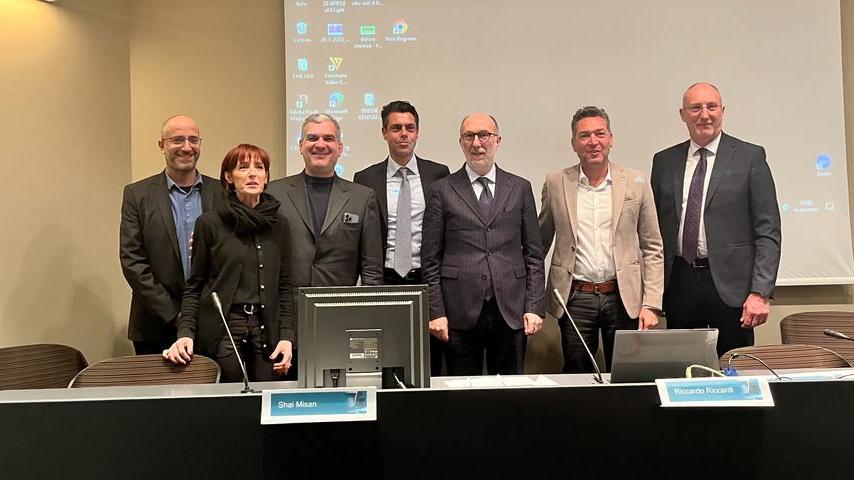

How do insurers tackle innovation in a connected world?
Uli Kleber, The Digital Insurer’s Germany News Correspondent, connects with Moshe Tamir who is perfectly positioned to discuss insurance and technology from his personal experience. After a long and successful career that included stints at Intel, Deputy CEO at Israeli insurer Migdal and Global Head of Digital Transformation at Generali Group, Moshe has just decided to launch his own company – Axell – an innovation builder, in Tel Aviv. In this interview Moshe shares his views regarding the value of client segmentation, proprietary salesforces that are super charged by technology and what insurers need to do with their innovation portfolio to stay ahead.
Uli Kleber: Moshe, after a long and successful career that included stints at Intel, Deputy CEO at Israeli insurer Migdal and Global Head of Digital Transformation at Generali Group, you have just decided to launch your own company – Axell – an innovation builder, in Tel Aviv. What was the reason for venturing out on your own now?
Moshe Tamir: During my 20 years of working in financial services, I have always felt and acted like an entrepreneur within large corporates. My greatest passion has been and always will be to find new ideas and bring them to life especially by partnering with outside ecosystems. So, my goal still is to continue doing what I love which is being an entrepreneur in financial services while helping others in their digital transformation journeys.
How are you helping companies in their digital transformation and product creation endeavors?
We provide strategic advisory for incumbent financial services companies by challenging them to rethink business models, client experience, data and technology.
Our main focus, and core, is in insurance, although we also support asset managers and some banks. Our highly specialized innovation ecosystem, based in Tel Aviv, Israel, (one of the most thriving in the world today,) gives us clear access to the best technological opportunities and startups in the fintech and insurance space. This creates accelerated growth opportunities for both our corporate clients, representing them on the ground here and for our technology partners.
The know-how we bring to the table is our experience in navigating complex company cultures, as well as the knowledge of the nature and business perspective of insurance including issues like compliance and risk management.
The digital transformation movement has been in full swing for a couple of years now. In which areas have the companies already done their homework? And which parts of the insurance value chain are still most in need of innovation?
That is a good question. I do not think that there is a simple answer to this. In my view, insurance companies have invested a lot, particularly in pricing and distribution. Still, I think that product design and claims optimization are the areas that are most lagging behind. The same goes for customer segmentation. Due to regulation, insurers have always been thinking in terms of product categories instead of client groups. This is why, to this day, there is the need to properly define and then serve new and underdeveloped segments, like small and medium enterprises (SMEs), the young population (which in the past were always considered high risk) as well as the elderly population.
What kind of use cases excite you the most? Do you have any specific examples you can share?
The use cases I love show a strong opportunity to leverage technology in creating a win-win for the company and client. Great examples for these are use cases that help to optimize client behavior. So, focusing on how people drive, how they take care of their home and security or take care of their health.
Another area is asset management, as it will enable financial advisors to give more variety of services. Artificial Intelligence and Machine Learning will bring more competitive value propositions to the table in this field. Apart from a product proposition perspective, it is also going to be a huge topic for insurers to manage their assets more professionally – particularly in a low interest environment.
Finally, the traditional sales network: how can you leverage technology to help your advisors and sales people better connect with their clients? We need to combine and enhance human advice with technological advice, particulary in the complex fields of life, health and financial planning. I think that the sales forces can do a much better job, if they are equipped with the right technological capabilities.
That is an interesting point. Why do you specifically mention tied agent sales forces in a time where the end of the agent has been proclaimed over and over and everybody seems to be moving to chatbots?
I think the value of personal advice will remain very important, particularly when we are talking about complex products like life and health. At the same time, insurers need to help their advisors give better advice through insights. Sounds traditional, I know. But I believe in the human connection.
Also, and this is a key area around which I work with my clients, insurance companies have built massive distribution networks. It will be super hard to disband these. Plus, why should they? These proprietary sales networks are one of their main assets. Enabling their advisors through technology will actually allow insurers to leverage the strength of their networks and help protect their future value. My vision is that insurers will sit together with their sales forces to work things out. In the end, everybody profits, the clients through better advice, the sales people through higher revenue and the insurance companies by protecting their investment.
What are the biggest obstacles to innovation and what do you recommend your clients to tackle these obstacles?
Today most insurers understand that there is a need to change. The big question is how?
Collaboration is not one of the typical strengths one would associate with the financial services industry. Usually, money is not a problem in this industry. So why collaborate if you can buy it? Why partner if you can own it? Why share a part of the value chain with someone else?
Connecting the legacy (tech and culture) of traditional players to a 21st-century digital company has become a huge challenge. This is also where it becomes an opportunity.
The successful financial services companies in the future will be the ones who partner with the right digital-native companies at the right time to drive their digital transformation forward.
Why does innovation seem to be so hard for insurers?
Insurers have always been risk-focused – that is the nature of their business. Unfortunately, the focus has moved a bit too much on reducing the risk instead of managing it. In today’s world, you need to take a portfolio approach and that also applies to your innovation activities. You already know that some of your innovations will fail, so make sure that you have a few alternatives running in parallel and then focus on the ones that turn out successfully. This is still hard for insurers, but the basis for innovation. This is why I always suggest to run a quick Proof of Concept (PoC), test the solution and, if it is not successful, to stop it early. Start fast and fail fast.
Also, the industry has always relied on internal resources. Today, however, you can and have to partner with external providers, which is, of course, a new mindset and, therefore, a challenge from a cultural and technological point of view. Ecosystems and the ability to move within them will be the future.
Thus, if you want to put it aggressively: insurers need to move from an ego system to an ecosystem. Instead of doing it all myself, I find the right partners to collaborate.
How do you see the convergence between InsurTech and FinTech? Does it still make sense to talk about two different sectors?
I do not see the two as different sectors. Fintech has evolved over the last six years by relying not only on technology but particularly by leveraging their ability to partner. This is something that tech companies are still learning to do. On the insurance side, I see even bigger opportunities to partner because through their business they are deeply involved in so many sectors, like e.g agriculture, mobility, cyber or health. That means that I see many areas in which insurers can collaborate and help to improve the status quo.
What are important trends in the Israeli InsurTech and FinTech market that you foresee to carry over into Central Europe?
Our specialized ecosystem that we have in Tel Aviv is one of the most thriving ecosystems ins the world. Israel is a strong hub for AI, cyber security, digital health and mobility which creates great synergies for our clients. Insurers often do not have subsidiaries here. So, even without opening up a branch office in Israel, they can still profit from the input while we help our local technology partners to scale internationally – this is a win-win for both sides. Most of our team comes from the Financial Services industry and have a long track record and experience in the sector.
You used to be a lecturer of innovation at Tel Aviv University – what recommendations do you give to students who would like to start their own business?
Firstly, deal with something you love. If you have passion for your topic, you will solve all challenges. Secondly, find the right partners and customers to test your ideas quickly and put them to practice. Finally, be very consistent and patient. Timing is everything and sometimes you just need to catch the right wave.
Those are indead some important pieces of advice. But what about those students that work for a large corporate – what can they to do foster innovation?
Right now, is actually the best time to work for a large corporate as they are starting to catch up. Often people think traditional companies are boring, but they have great access, expertise, captial, knowledge and compliance systems in place. The successful corporates will be the ones with the right ecosystems and not just those that have a great technology. This means that those corporates who know how to partner will be the winners. So, to me this is a great moment to transform the business, if you take the right steps.
Link: https://www.the-digital-insurer.com/how-to-move-from-an-ego-system-to-an-ecosystem-interview-on-innovation-with-moshe-tamir-founder-of-tel-aviv-innovation-builder-axell/, by Uli Kleber


